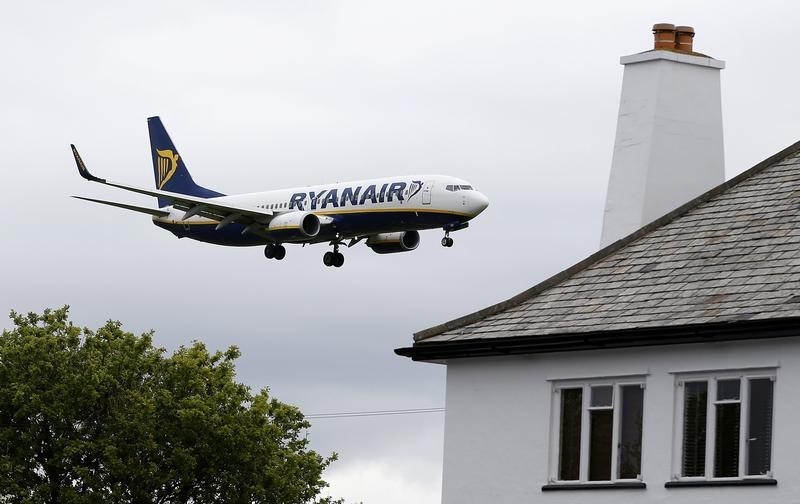By Victoria Bryan and Jeffrey Dastin
BERLIN/NEW YORK (Reuters) - Airlines are trying to draw passengers away from low-price comparison sites and back to their own home pages, seeking to boost profits by selling them extra services such as additional legroom or access to airport lounges.
Airlines across Europe and the United States are experimenting with strategies to bring travelers back to their own websites. These range from improving the booking process to adding fees for tickets booked using third-party distributors, which themselves charge airlines for their services.
Many airlines see customizing travel packages with lounge access, extra legroom or hotel stays and restaurant bookings as the area where revenue has greatest scope to grow. That model can conflict with comparison sites that market only base fares.
German carrier Lufthansa (DE:LHAG) gets just 10 percent of its revenues come from such ancillary sales and wants to grow that by an unspecified amount. Ryanair (I:RYA), which had led the way in selling such add-ons, gets over 30 percent of its revenues from ancillaries.
Third party sites offer airlines access to a wider audience but for a fee and also at the expense of control of sales.
"Airlines are excited to get their product on to the shelves," Scott Wilson, vice president of eCommerce and merchandising for United Continental Holdings Inc (N:UAL) told Reuters.
"They just need to be displayed in the correct way."
"I can see a scenario in which United would not want to work with partners that weren't helping advance our corporate strategy," he added, although United aims to be "agnostic" about where customers buy its services.
Ryanair is overhauling its website to offer its 100 million annual passengers flight price comparisons, cheap hotel rooms and location-based restaurant discounts.
CEO Michael O'Leary told Reuters last month that he wants rival airlines to share their prices on the low-cost carrier's website, although that idea has not yet been embraced by his competitors.
"There is this level of trust whereby customers don't believe that an airline will show them the best that (a rival) has got," Gordon Wilson, CEO of distribution and technology company Travelport Worldwide Ltd (N:TVPT) told Reuters.
TAILOR-MADE
The major airlines each spend hundreds of millions of dollars annually to distribute their fares via global distribution systems (GDS), provided by Amadeus IT Holding (MC:AMA), Sabre Corp (O:SABR) and Travelport.
That allows fares to be easily compared by corporate travel bookers and directly by consumers.
Aiming to recoup costs, Lufthansa has introduced a 16 euro fee for bookings via GDS companies, a move which those businesses and travel managers have criticized. Lufthansa says its annual GDS costs are over 100 million euros ($113 million) and that GDS costs are "several times higher" than other booking channels.
"We have seen such big differences in cost via the various sales channels and we've seen more and more demand from our passengers for more personalized services," CEO Carsten Spohr told Reuters in an interview.
These latest moves in the tug of war between airlines and fare distributors have prompted some consumer advocates and travel technology companies to warn that carriers are making it tough for travelers to compare prices.
The U.S. Transportation Department is considering introducing a rule to require airlines to disclose ancillary fees at all points of sale.
Airlines say they are among the world's most transparent industries when it comes to pricing, despite differences among their products and charging for services such as baggage and seat choice that complicate comparisons.
OLD HABITS
It won't be easy getting customers back to individual airlines' websites though.
Nearly half of travelers who book online use an online travel agent such as Expedia Inc (O:EXPE) or metasearch sites like Priceline Group Inc's Kayak (O:PCLN), or TripAdvisor Inc (O:TRIP), according to the Travel Technology Association, their Washington-based trade group.
"No matter how seamless a website is, customers are used to using aggregators... for house insurance, motor insurance, mortgages, anything we start to look for, we price compare," said Marc Alsopp, senior vice president and head of global business development for loyalty analytics company Aimia (TO:AIM).
Illustrating the swift rise of the online travel firms, Lufthansa had the same market capitalization as Priceline back in mid-2009, but since then Priceline's value has jumped to $63 billion, 10 times that of Lufthansa.
Carsten Schaeffer, head of central Europe and Nordics at Sabre Travel Network, said it was difficult for airlines to match the service offered by distributors.

"We connect to 400 airlines. We're a specialist. Is an airline? I have my doubts," he said.